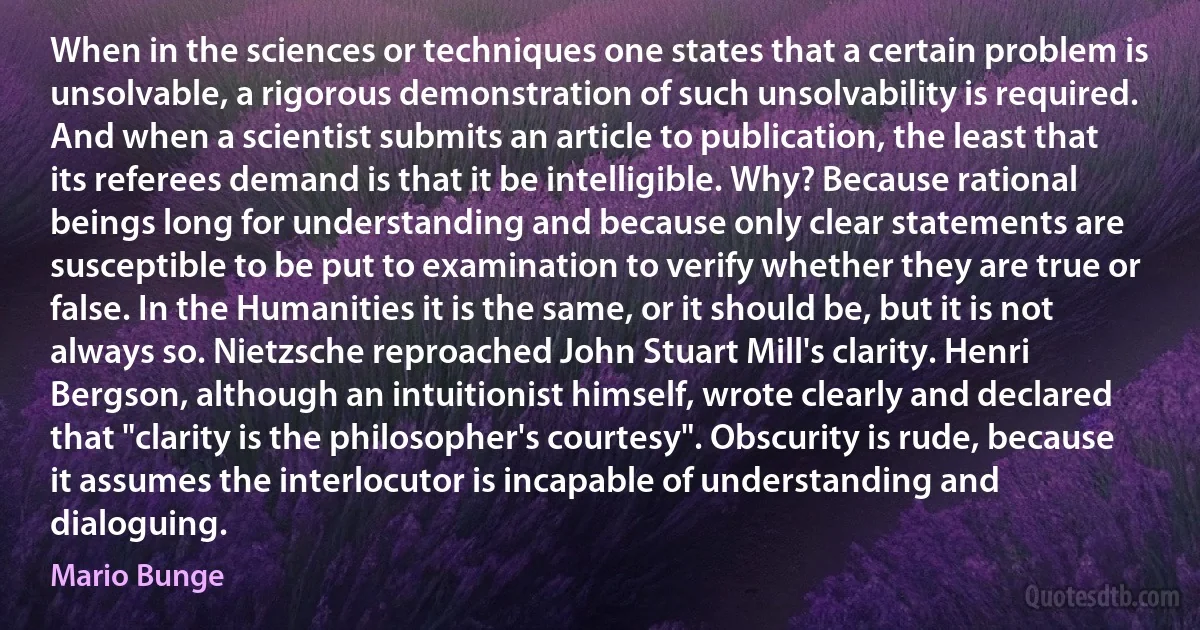
When in the sciences or techniques one states that a certain problem is unsolvable, a rigorous demonstration of such unsolvability is required. And when a scientist submits an article to publication, the least that its referees demand is that it be intelligible. Why? Because rational beings long for understanding and because only clear statements are susceptible to be put to examination to verify whether they are true or false. In the Humanities it is the same, or it should be, but it is not always so. Nietzsche reproached John Stuart Mill's clarity. Henri Bergson, although an intuitionist himself, wrote clearly and declared that "clarity is the philosopher's courtesy". Obscurity is rude, because it assumes the interlocutor is incapable of understanding and dialoguing.
Mario BungeRelated topics
article certain clarity clear courtesy false humanities john least problem publication should susceptible understanding nietzsche unsolvable sciences statesRelated quotes
A member of the human race who is completely incapable of understanding the higher productivity of labor performed under a division of labor based on private property is not properly speaking a person... but falls instead into the same moral category as an animal – of either the harmless sort (to be domesticated and employed as a producer or consumer good, or to be enjoyed as a "free good”) or the wild and dangerous one (to be fought as a pest). On the other hand, there are members of the human species who are capable of understanding the [value of the division of labor] but...who knowingly act wrongly... [B]esides having to be tamed or even physically defeated [they] must also be punished... to make them understand the nature of their wrongdoings and hopefully teach them a lesson for the future.

Hans-Hermann Hoppe
An examination of the characteristics required by the employees and heads of undertakings of every kind leads to the same conclusions as the foregoing study, which was confined largely to industrial concerns. In the home and in affairs of State, the need for administrative ability is proportional to the importance of the undertaking. Like every other undertaking, the home requires administration, that is to say planning, organization, command, coordination and control. Nothing but a theory of administration, which can be taught and then discussed by everybody, can put an end to the general uncertainty as to proper methods, which exists in the isolation of our households. There is therefore a universal need for a knowledge of administration.

Henri Fayol
You are faced with the problem of what to do in respect to this question, to that question, and to the other question, but perfectly obviously, after you have faced the more superficial aspects of the separate questions, you want to know in relation to a complete plan what you are actually giving and what you are actually getting. Therefore, when the departmental, or compartmental, exploration has gone on to a certain extent it cannot be finished until somebody, co-ordinating all your problems, sets out in one statement and declaration the complete scheme that this Conference can pass in order to give security, to give disarmament, to give hope to the future–until that scheme has been placed before you, you cannot complete your examination of compartmental problems and questions...

Ramsay MacDonald
To make a law final, so as not to be reached by Congress, is, by mere legislation, to fasten a new provision on the Constitution. Nay, more; it gives to the law a character which the very Constitution docs not possess. The wise fathers did not treat the country as a Chinese foot, never to grow after infancy; but, anticipating Progress, they declared expressly that their great Act is not final. According to the Constitution itself, there is not one of its existing provisions - not even that with regard to fugitives from labor - which may not at all times be reached by amendment, and thus be drawn into debate. This is rational and just. Sir, nothing from man's hands, nor law, nor constitution, can be final. Truth alone is final.

Charles Sumner
The problem is this: Nature has assembled all these species on this planet. The human species is no more important than any other species on this planet. For some reason, man accorded himself a superior place in this scheme of things. He thinks that he is created for some grander purpose than, if I could give a crude example, the mosquito that is sucking his blood. What is responsible for this is the value system that we have created. And the value system has come out of the religious thinking of man. Man has created religion because it gives him a cover. This demand to fulfill himself, to seek something out there was made imperative because of this self-consciousness in you which occurred somewhere along the line of the evolutionary process. Man separated himself from the totality of nature.

Thomas Ligotti
